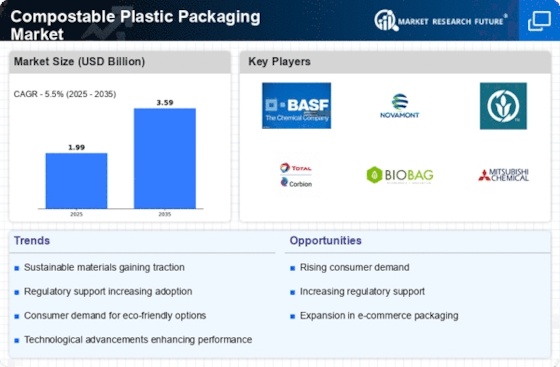Top Industry Leaders in the Compostable Plastic Packaging Market

The ubiquitous plastic packaging, once seemingly an unstoppable tide, is meeting its match in the burgeoning compostable plastic packaging market. this dynamic space is where ingenuity wrestles with convenience, as eco-conscious consumers and responsible brands seek alternatives to petroleum-based plastics. Let's delve into the strategies employed by key players, the factors influencing market share, and the exciting developments propelling this transformative domain.
Strategies Shaping the Compostable Arena:
-
Material Maverickism: Leading companies like NatureWorks and Bio-Flex are pioneering new bio-based and biodegradable polymers like PLA (polylactic acid), PHA (polyhydroxyalkanoates), and cellulose derivatives. Think sturdy plates crafted from corn starch, flexible pouches spun from bacterial cellulose, and transparent films derived from agricultural waste. -
Compostability Champions: Ensuring complete decomposition in home or industrial compost facilities is paramount. Companies like Eco Products and World Centric are developing certified compostable materials that break down rapidly without harmful residues. -
Partnerships and Powerplays: Strategic alliances with food chains, retailers, and packaging manufacturers help brands gain access to new customer segments and leverage existing distribution networks. Think co-branded compostable packaging initiatives between food companies and composting service providers. -
Sustainability Symphony: Implementing ethical sourcing of raw materials, minimizing energy consumption during production, and reducing carbon footprint are key for brands to resonate with eco-conscious consumers. -
Consumer Education Crescendo: Raising awareness about the benefits of compostable packaging and educating consumers on proper disposal methods is crucial for driving market adoption. Interactive campaigns, educational partnerships, and clear labeling are essential tools.
Factors Influencing Market Share:
-
Performance and Functionality: Compostable packaging must offer comparable shelf life, protection, and convenience to traditional plastics to gain widespread acceptance. This includes considerations like moisture resistance, grease barrier properties, and temperature tolerance. -
Cost Competitiveness: Bridging the cost gap between compostable and traditional packaging remains a challenge, but economies of scale, technological advancements, and government incentives are steadily narrowing it. -
Regulatory Landscape: Stringent regulations on plastic waste and landfill diversion in countries like the European Union and India are creating lucrative opportunities for biodegradable alternatives. -
Brand Reputation and Sustainability Commitment: Consumers are increasingly choosing brands with strong environmental credentials, making sustainability a key market differentiator. -
Geographical Expansion: Entering emerging markets with high plastic consumption and growing environmental consciousness presents significant growth potential.
Key Players:
- TIPA LTD (Israel)
- Riverside Paper Co. Inc. (US)
- SmartSolve Industries (US)
- Özsoy Plastik (Turkey)
- Ultra Green Sustainable Packaging (US)
- Hosgör Plastik (Turkey)
- Eurocell S.r.l (UK)
- Tetra Pak International SA (Switzerland)
- Kruger Inc. (Canada)
- Amcor PLC (Switzerland)
- Mondi (UK)
- International Paper Company (US)
- Smurfit Kappa (US)
- DS Smith (UK)
- Klabin SA (Brazil)
- Rengo Co. Ltd (Japan)
- WestRock Company (US)
- Stora Enso (Sweden)
- Bemis manufacturing company (US)
- Rocktenn (US)
- BASF SE (Germany)
- Clearwater Paper Corporation (US)
Recent Developments:
Nov 2022: Chocal introduces packaging that is "easily compostable." The Chocal packaging solution is innovative; the materials used to make the packaging are coated, formable papers called Chocal Paper Fibres (CPF) or transparent cellulose materials specifically created by the business Chocal Natural Fibres (CNF).
June 2022: Global beer giant Corona announced the introduction of a new six-pack that is entirely compostable and compostable plastic, and it is created simply of barley straw in India. Reaffirming its greater objective of conserving and preserving nature, Corona has introduced a new circular package design. The new six-pack from Corona that is composed entirely of barley straw is in line with the concept of "Living Sustainably in Harmony with Nature" for World Environment Day, which is "Only One Earth" this year.
In October 2023, Pakka Limited, previously named Yash Pakka Limited, a producer specializing in environmentally-friendly packaging solutions, has launched India's inaugural compostable flexible packaging. This huge advancement is achieved through a partnership with Brawny Bear, a well-known nutrition company specializing in nutritious food products produced from dates. The introduction of this compostable flexible packaging is a significant achievement in India's packaging business, which has a market worth of $70 billion. Flexible packaging is the leading component of India's packaging industry, accounting for over 60% of the market. It is a frequent occurrence in daily life, involving a diverse array of products ranging from small shampoo packets to biscuit packages. Flexible packaging has become an essential component of contemporary life due to its convenience, versatility, and cost-effectiveness. Nevertheless, the increase in convenience has been accompanied by escalating environmental apprehensions linked to traditional non-biodegradable plastic-based flexible packaging. Recycling conventional flexible packaging is still a big difficulty because of its intricate multi-layered construction and thinness. Pakka Limited's foray into flexible packaging is a logical advancement for the company, which has focused on manufacturing biodegradable pulp and paper packaging solutions and molded dinnerware for over forty years.










